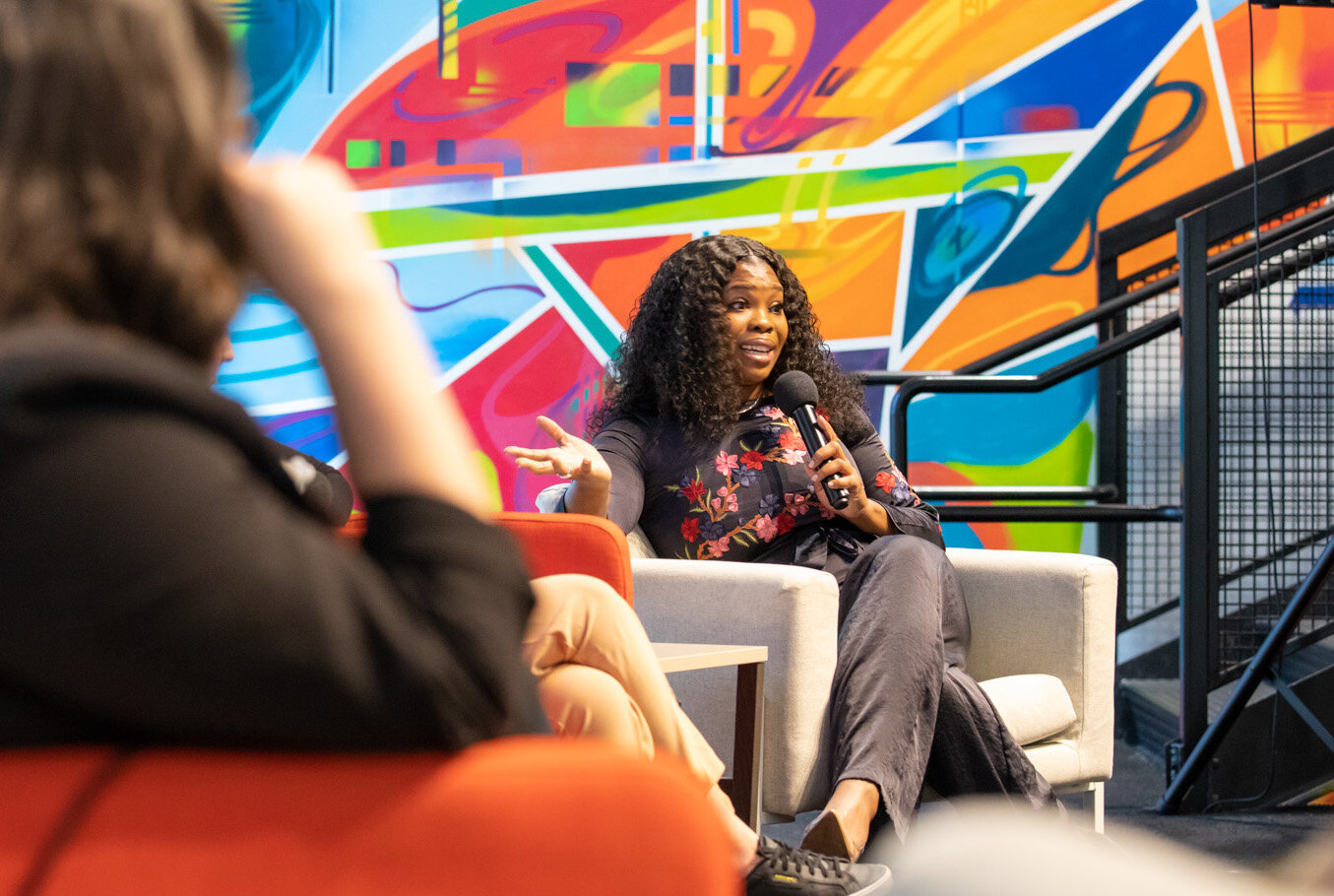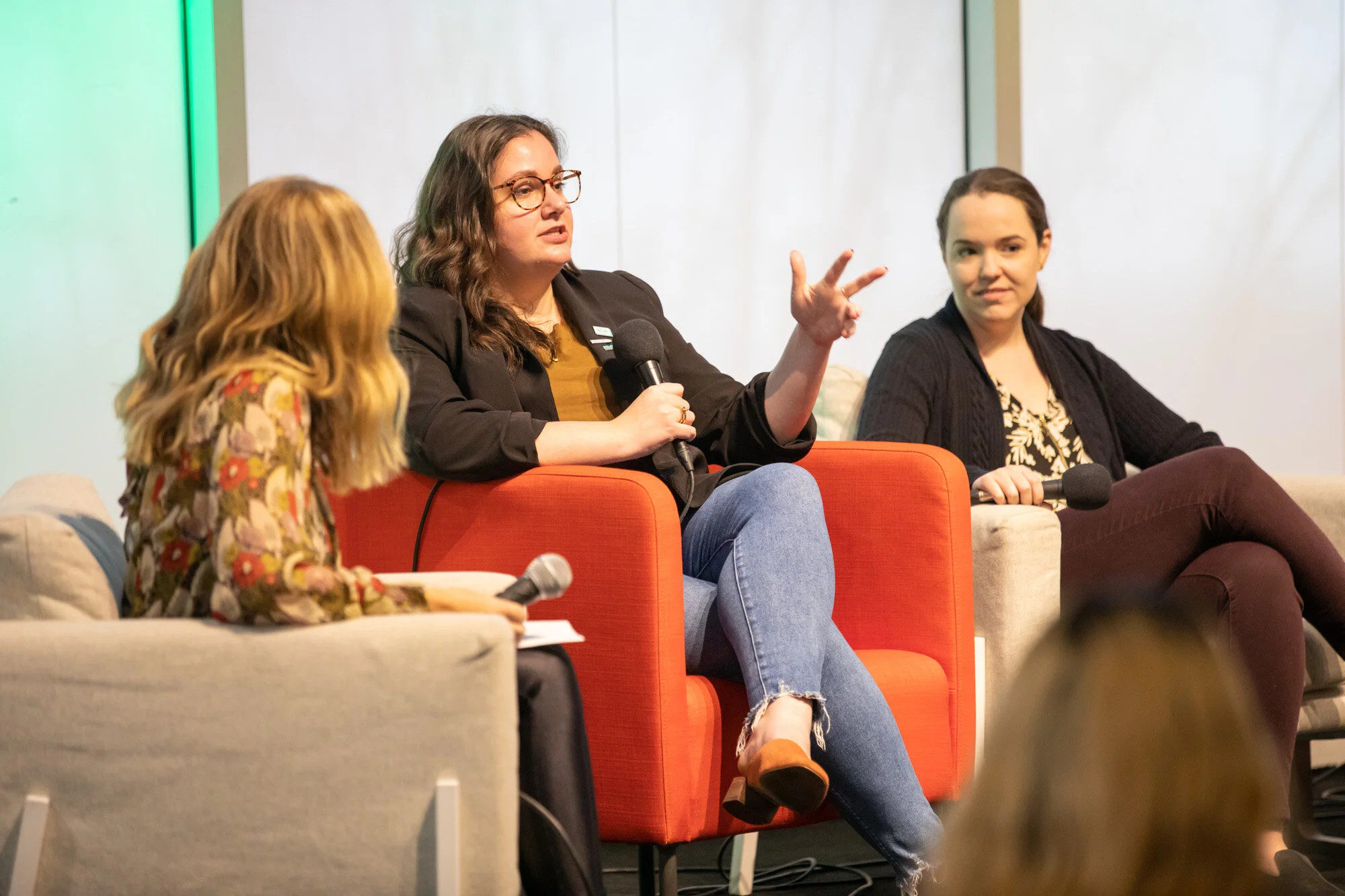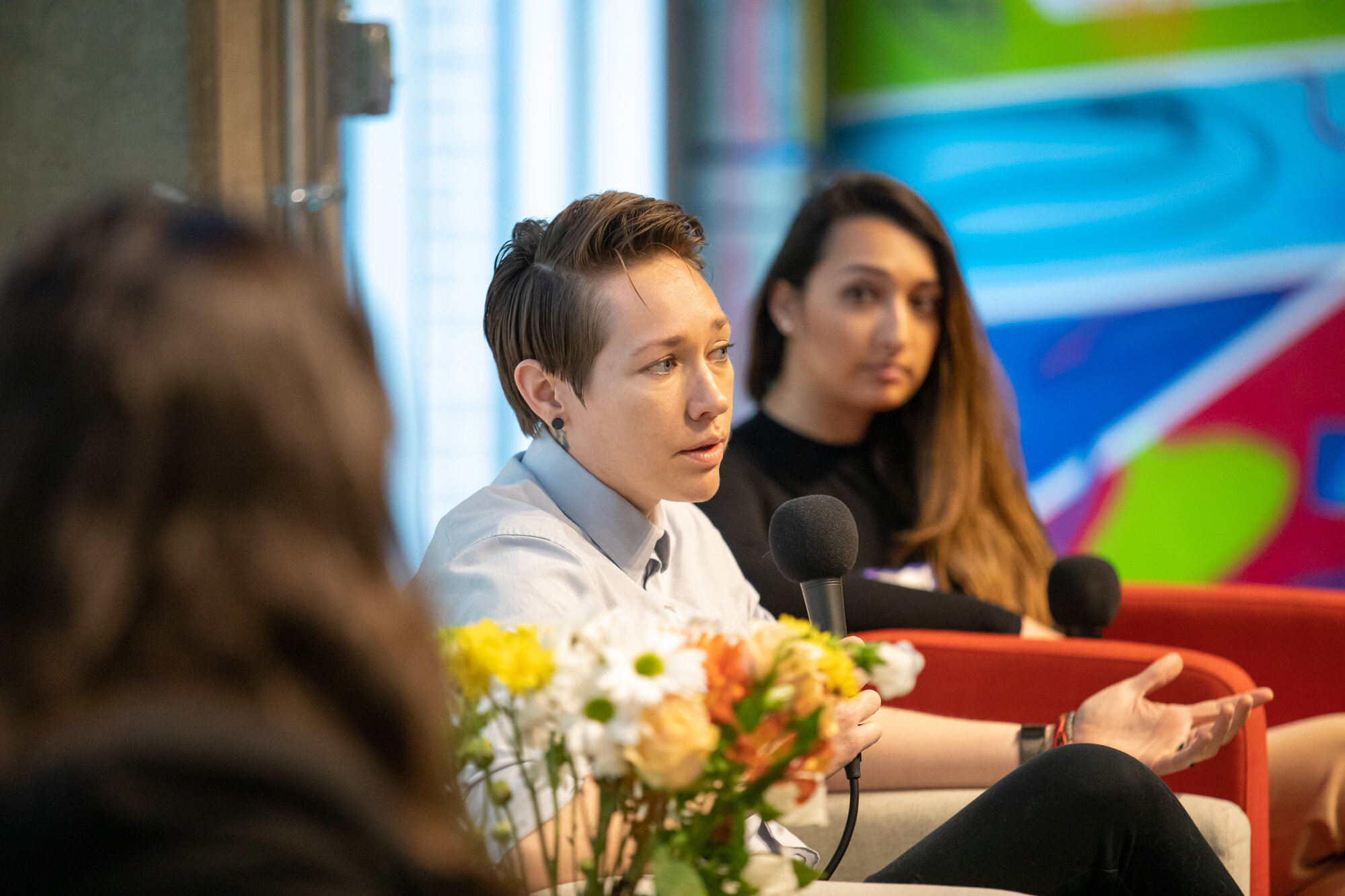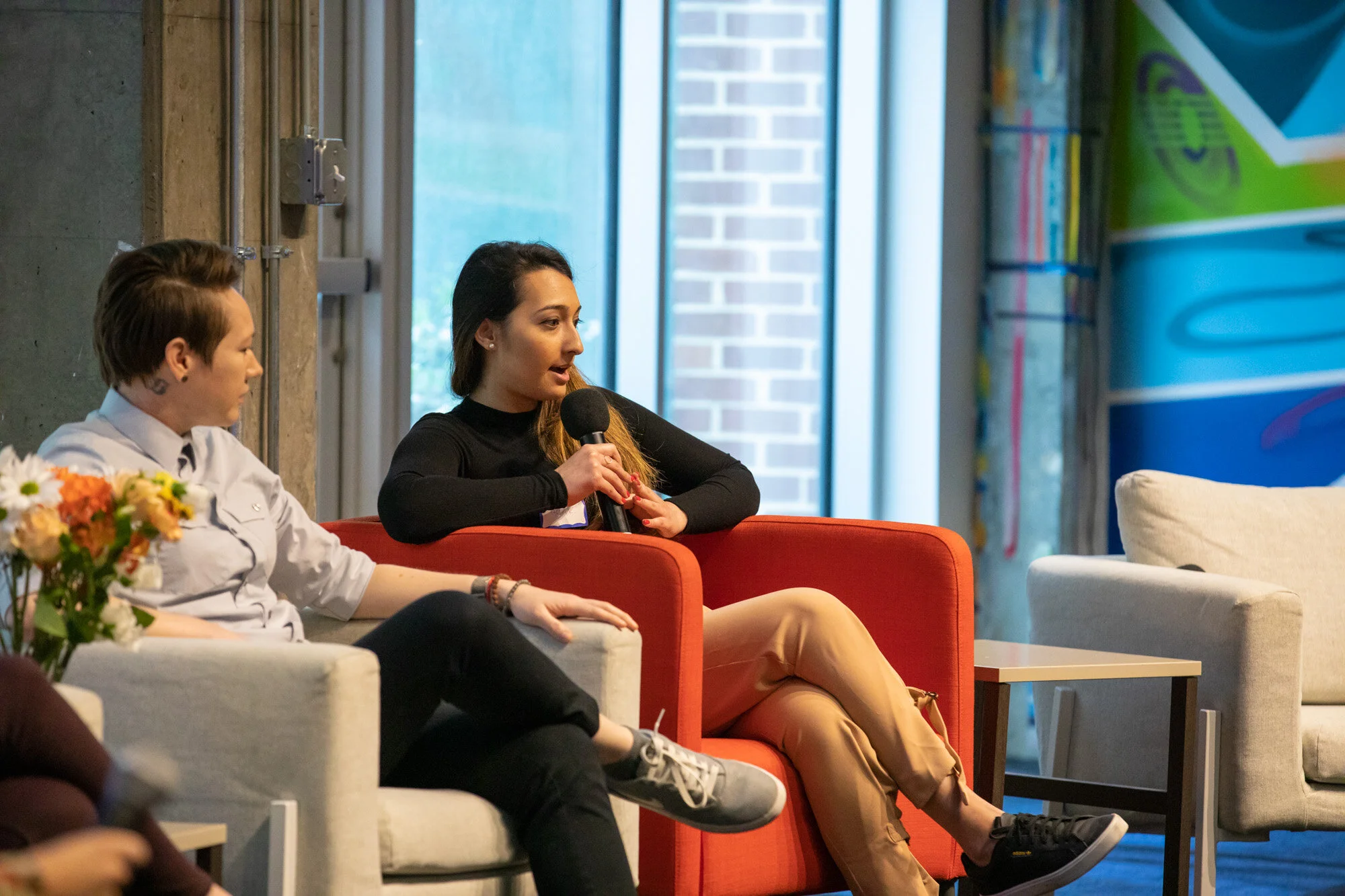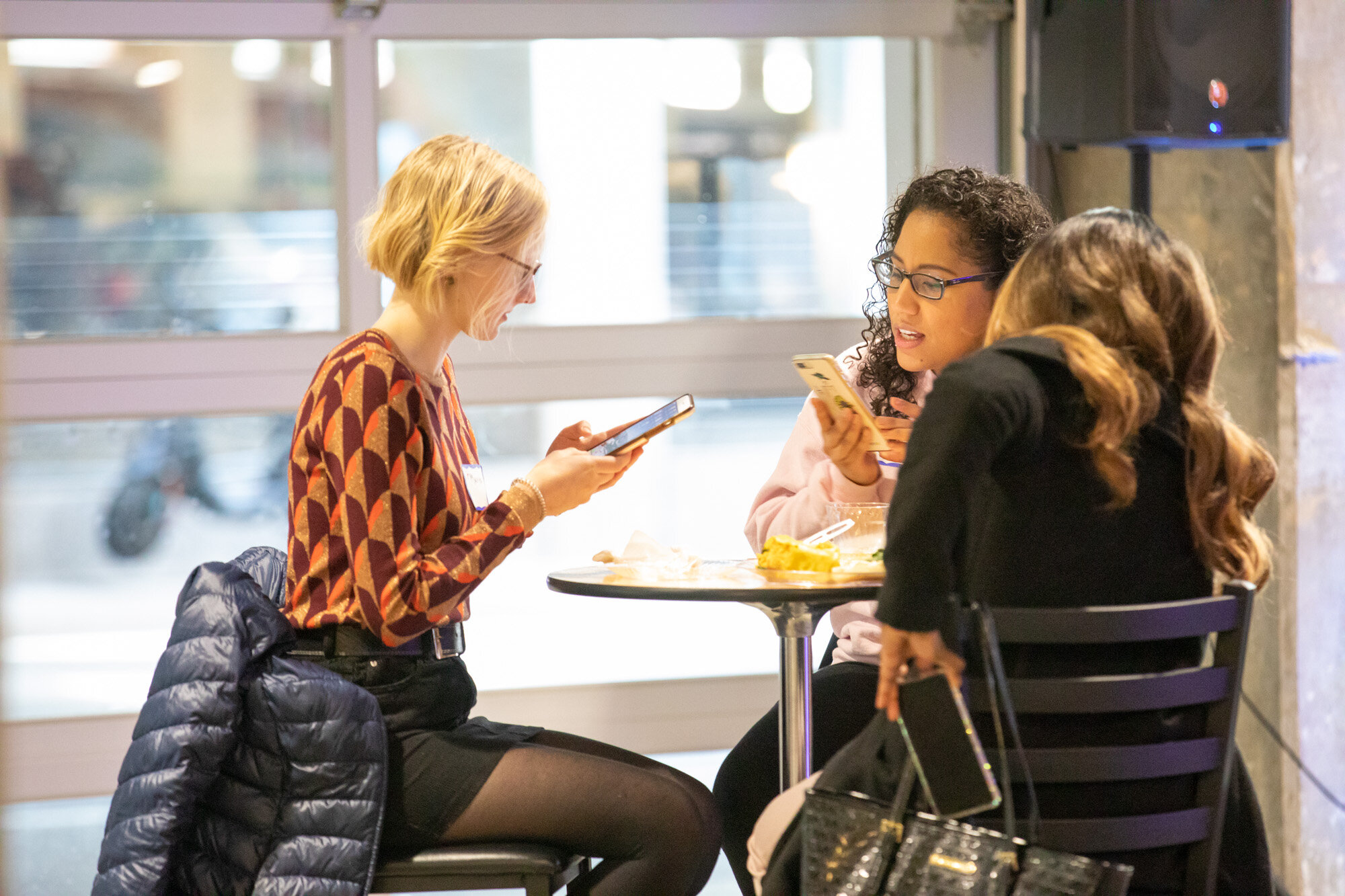5 Ways To Combat Confidence Issues At Work
Maintaining confidence in the boardroom - whether it’s pitching your own business as an entrepreneur or moving the needle as an intrapreneur - is a common challenge especially among women.
That’s why on International Women’s Day, we brought together accomplished women and allies from different experiences - ranging from startups to Fortune 500 corporations - to explore perspectives on confidence issues in the workplace, allyship, and more. Here are 5 tactical approaches we learned from our conversation on how to overcome confidence issues.
1. Stop apologizing. Don’t be afraid of how you’re going to sound.
Picture this scenario: a woman in a meeting chimes in with “Sorry, here are my thoughts on that..” Sound familiar? Women tend to lead in with a form of apology before making a statement.
How to change that habit: Start counting how many times you say “sorry” in one day. This can help boost your self-awareness and cut the negative self-talk. Like all habits, saying “sorry” less can take time to develop, so ask yourself what you’re apologizing for after it happens.
In addition to changing the habit of saying sorry, another way to start combatting confidence issues at work is to stop being afraid of how you’re going to sound. “If someone says something in a meeting that you already said earlier, be willing to say ‘That’s what I said 5 minutes ago,’ or ‘That’s the point I was trying to make’,” recommends Jenna Settle, who is a Senior Engineer at Abbott. Because exchanges can get heightened in the boardroom, be sure to make your statement in a respectful and friendly way.
“Take ownership [of your ideas]. Don’t be afraid of how you’re going to sound. If you’re prepared and communicating clearly, you’re not going to come off ‘the wrong way’.”
2. Come prepared with statistics. Know your audience, and speak their language.
Confidence comes from knowing the worth of your work. Backing your work up with hard data will make the presentation of your ideas stronger. Don’t go into an important conversation empty-handed because chances are, somebody’s going to ask you a difficult question. On the contrary, be honest if you don’t know the answer and be ok with saying “I’m not sure, I will get back to you.”
How to navigate the conversation when you don’t know the answer: Be honest with what you know and what you don’t. Build rapport with people who are stronger in skills you need to improve on. Loop them into the context of the important presentation and be specific with your ask, so they are also prepared when they are called on.
“Know your audience and speak in terms they know. When I first started fundraising, I was talking about hunger to a lot of wealthy investors who have no idea what experiencing hunger is like. Conversely, I’m not a technical founder, so I listened intently to the questions and statistics they asked for and made sure I understood what I didn’t know.”
3. Build your ally groups.
Building a career can feel like a lonely road. Here’s the good news (in the words of Brené Brown): you don’t have to go it alone. This is why allyship is important. But first, what does allyship mean?
An ally is “any person that actively promotes and aspires to advance the culture of inclusion through intentional, positive and conscious efforts that benefit people as a whole,” as defined by multi-award winning Diversity and Inclusion leader, Sheree Atcheson. “Allyship is: a lifelong process of building relationships based on trust, consistency, and accountability with marginalized individuals and/or groups of people. Allyship is not self-defined— your work and efforts must be recognized by those you are seeking to ally with.”
How to build allyship: Start showing up for people and support them. Build rapport with your colleagues by recognizing them for who they are as a person, the work they are passionate about, and all they have accomplished. Learn about their perspectives on shared business goals and what they’re doing to accomplish them.
“Whether you can get along with everyone is irrelevant. The fact is, everyone wants to be seen. I like to make sure that we start off on the same foot, and there’s a shared understanding that I see my colleague for who they are, and they see me for who I am. That way, they know that I see them individually instead of a large group of nameless engineers. I know what brought them to this team, why they are passionate about [this type of] engineering, and they know that I’m looking out for them moving forward.”
4. Amplify others.
It takes being a strong ally to know one, so lead by example if you want to build an allyship. When you see someone having a good or bad day, thank them for the work they are doing. Make sure that the bottom line of what you’re thanking them for is delivered. This can sound something like, “Hey, thanks for the report you created. It helped me convince our board to increase our budget during our meeting today.” In other words, you can build rapport simply by amplifying others.
“Your allies need to echo your ideas, identify you by your name and pronoun, account for the information you brought, and credit what you brought to the table.”
5. Get comfortable with ambiguity. Be okay with asking for guidance, but follow your gut.
You know your business and your career goals more than anyone else. Know that there are many ways to accomplish a goal, so take caution if an advisor claims that their method is the only “proven way” to accomplish something. If you ever feel confused about making a decision, trust your collective learnings from your own experiences, know your “why”, and do your research. Learn from your decisions, iterate, and keep going.
“You should know who you should go to for specific types of advice, and know when to trust your gut.”
Missed our brunch? Watch the below recap video to get a glimpse of what you missed, or listen to the audio recording of our conversation below.
We partnered with Self Made Sisters to celebrate International Women’s Day featuring the women quoted in this article. Learn more about who they are below.
Jasmine Crowe — Founder & CEO, Goodr.Co
Jasmine is an award-winning social entrepreneur who is working to make the world a better place one cause at a time. Jasmine’s goal is to foster change and create awareness about the leading socioeconomic issues and challenges of today, including poverty, food waste, and hunger. In 2017 after years of feeding people experiencing homelessness from her own kitchen, she launched Goodr, a sustainable waste management app that leverages technology to combat hunger. She has been featured on CNBC, Oprah Magazine, Inc., Forbes, Fast Co., NY Times, and was named by Entrepreneur Magazine as one of the top 100 influential female founders. Under her direction, Goodr has redirected over two million pounds of surplus food from restaurants, event centers, airports, and businesses to the millions of people who are food insecure. Goodr clients now include SAP, Netflix, Hartsfield Jackson Airport, Georgia World Congress Center, and many more.
Margarita Caraballo — Chapter Director, Techqueria | Product Manager, MailChimp
Margarita is product manager focusing on the performance engineering space. Across her many years working in the technology field, she has played various roles on a variety of teams. She’s worked as an individual contributor to some amazing teams, but also as a project manager, organizational manager, project planner, and pilot runner. Currently, she is a member of the Product Management team at Mailchimp.
Her personal passions in work include the identification of areas of weakness in process and technology and then planning and piloting tests of resolutions. She also greatly enjoys data analysis and surfacing resolutions to issues that are very data driven. Outside of her day-to-day work, she is an Atlanta Chapter Director for Techqueria, a non-profit that serves the largest community of Latinx in Tech and the Committee Chairperson for the Innovation Committee of the STEM Advisory Board at South Atlanta High School.
Aleshia Eckard — E-Commerce & Digital Strategy Manager, Siemens Smart Infrastructure
Aleshia has over 10 years of experience in the electrical manufacturing industry spanning from; Supply Chain, Engineering, Data Analytics and E-commerce Strategy. At the core of Aleshia’s professional and personal journey is her desire to create meaningful relationships that foster trust, creativity and support within communities.
Jenna Settle — Senior Engineer - Product Development, Abbott
Jenna is a research and development engineer that has been working in the medical device industry for 7 years. Her background is in biomedical engineering and her career has concentrated on work with microelectromechanical systems (MEMS), cardiac devices, and implantables. Outside of work, Jenna is passionate about art, social issues, volunteering, and the outdoors.
Ifrah Khan — Founder & CEO, Usit.Inc
Ifrah Khan, is the founder of Usit, a last-minute babysitting app that connects busy parents to vetted college student babysitters in their community. Ifrah was named one of Atlanta Inno’s 25 under 25 entrepreneurs in 2018 and has a passion for how technology can help create new communities and opportunities in dual sided marketplaces. She recently completed Atlanta Tech Village’s Pre-Accelerator and is focusing on disrupting the babysitting industry. Although she’s not a mom, Ifrah is passionate about helping parents, students, and children in need. She serves on the board of Helping Mamas and brings together other young entrepreneurs with her position as a Kairos Society Executive.
Stefanie Jewett (Moderator) — Founder & CEO, Activvely
Stefanie Jewett is the founder and CEO of Activvely, the premiere social-pairing app that connects you with platonic fitness buddies. Stefanie’s path as a technology entrepreneur isn’t a conventional one; as a recovering journalist, she spent five years covering hard news at CNN, until her creativity breached the spillway and Activvely was born. A Miami native, Stefanie grew up in a Spanish-speaking household, her Cuban roots never far from her heart. Living in the Washington D.C. area, inspired her to pursue a journalism career and her passion for news would see her at the U.S. Congress, National Republican Senatorial Committee, WSET, the Alliance to Save Energy and ultimately, CNN. Stefanie returned to Atlanta with a singular goal: to disrupt the traditional purpose and misconceptions of ‘swipe’ technology platforms solely being used for dating and help Atlantans connect for recreational fitness.
About our partner: The Self Made Sisterhood
Serving thousands of women across the Southeast, our sisterhood elevates entrepreneurship with events, education, and resources. Our goal is to help others: Grow stronger businesses; Learn the skills and strategies necessary to reach the next level; Forge genuine connections (and even friendships!) with fellow female entrepreneurs to build stronger networks.


